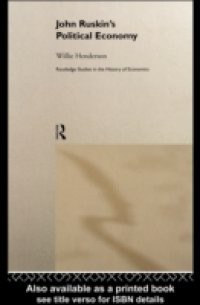This volume offers an exciting new reading of John Ruskin's economic and social criticism, based on recent research into rhetoric in economics. Willie Henderson uses notions derived from literary criticism, the rhetorical turn in economics and more conventional approaches to historical economic texts to reevaluate Ruskins economic and social criticism. By identifying Ruskin's rhetoric, and by reading his work through that of Plato, Xenophon, and John Stuart Mill, Willie Henderson reveals how Ruskin manipulated a knowledge base. Moreover in analysis of the writings of William Smart, John Bates Clark and Alfred Marshall, the author shows that John Ruskin's influence on the cultural significance of economics and on notions of economic well-being has been considerable.

